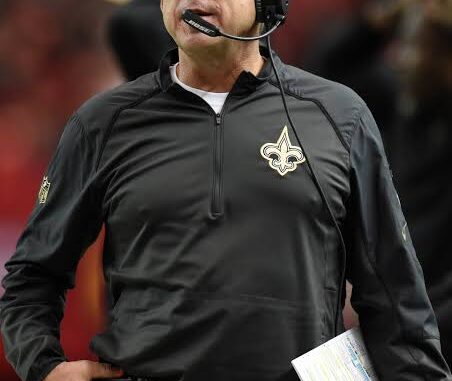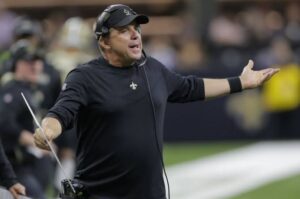
Due to Sean Payton unqualified acts, he has just been withdrew as Denver Broncos head coach.
The National Football League (NFL) is a place where reputations are built on discipline, leadership, and results. Head coaches often carry the responsibility of guiding not only players but also shaping the identity of an entire franchise. For the Denver Broncos, the decision to part ways with Sean Payton marks a stunning turn of events. The headline-grabbing move has left fans, analysts, and even rival organizations buzzing: Payton, once celebrated as a master strategist, has now been withdrawn as head coach due to what the organization has described as his “unqualified acts.”
The decision represents a dramatic fall from grace for a coach who entered Denver with high expectations, bringing a championship résumé and years of experience. Yet, despite his decorated past, the Broncos have concluded that Payton’s behavior, decision-making, and overall approach fell short of the professional and organizational standards demanded in one of football’s most competitive environments.

The Arrival of Sean Payton in Denver
When Sean Payton joined the Denver Broncos, hope surged across Colorado. His record with the New Orleans Saints had already been etched into NFL history. Leading the Saints to their first Super Bowl victory in 2009, Payton was regarded as one of the league’s sharpest offensive minds. After years of instability at the head coach position, Denver saw Payton as the figure who could restore glory and consistency to a franchise that had been struggling since the retirement of Peyton Manning.
The Broncos invested heavily to secure his services, trading valuable draft capital and offering a lucrative contract. Expectations were clear: Denver was not just looking for incremental improvement. They were seeking a cultural reset and the resurgence of a championship-caliber team.
But the optimism that greeted his arrival quickly clashed with realities that unfolded behind the scenes. Reports of questionable decisions, strained relationships, and unconventional approaches slowly began to overshadow the hopeful narrative of a legendary coach revitalizing a storied franchise.
The Nature of the “Unqualified Acts”
While the Broncos’ official statement stopped short of detailing every incident, multiple sources close to the team have indicated that Payton’s conduct had been raising alarms for months. These “unqualified acts” ranged from professional misjudgments to behaviors that left both players and front-office staff unsettled.
1. Questionable Team Management:
Payton’s management style reportedly created rifts within the locker room. While known for his demanding personality, insiders noted that his critiques often crossed the line from tough coaching into personal attacks. Players who were expected to thrive under his leadership instead struggled to perform, citing low morale and unclear guidance.
2. Strategic Missteps:
On the field, some of his play-calling and roster decisions bewildered fans and analysts alike. Star players were sidelined in critical moments, and game plans appeared erratic rather than calculated. The once-vaunted offensive creativity that defined his Saints career seemed inconsistent in Denver.
3. Front Office Tensions:
Sources also suggested that Payton clashed with executives over personnel choices and organizational vision. His insistence on autonomy often undermined collaborative efforts, creating friction at the very top of the Broncos’ hierarchy.
4. Cultural Disconnect:
Perhaps most troubling were the signs of cultural disconnect. The Broncos had been working to foster a new era of accountability, inclusivity, and modern leadership. Payton, however, was perceived as clinging to outdated methods that alienated both young players and newer staff members.
Taken together, these issues painted a picture of a coach out of step with his environment, unable to adapt to the evolving demands of the NFL and the Broncos’ organizational goals.
The Decision to Withdraw
Firing or withdrawing a head coach is never a decision made lightly, especially one with Payton’s pedigree. The Broncos’ ownership and front office deliberated extensively before making the call. The final decision appears to have been motivated not just by short-term performance, but by long-term concerns about the stability and direction of the franchise.
The word “withdrawn” in their announcement carries weight. It signals that this separation is not framed as a simple firing based on results but as an organizational necessity due to conduct deemed “unqualified.” This phrasing suggests the Broncos want to distance themselves not only from Payton’s recent record but also from the principles behind his leadership.
The Reaction From Players and Fans
Reactions to Payton’s removal have been mixed but generally lean toward understanding. Some players, speaking anonymously, admitted relief that the team could move forward without the internal drama that had clouded recent months. Others expressed disappointment, pointing to his legacy and arguing that he deserved more time to rebuild.
Fans, on the other hand, are divided. Broncos Nation is one of the NFL’s most passionate fan bases, and many were initially thrilled at Payton’s hiring. Now, the frustration is palpable. Some fans feel betrayed by what they view as a misuse of organizational resources and time, while others applaud the ownership for acting decisively before more damage was done.
The Legacy Question
Sean Payton’s legacy is now complicated. On one hand, his accomplishments with the New Orleans Saints remain undeniable. He lifted a struggling franchise into relevance, built a powerful offensive system, and delivered a Super Bowl title. On the other, his time in Denver raises questions about whether his coaching style and decision-making are still suited for the modern NFL.
For Payton personally, this episode could represent either a temporary stumble or a lasting stain. Much will depend on whether he chooses to step away, reflect, and adapt—or if he attempts to pursue another coaching opportunity despite the shadow of his withdrawal in Denver.
What’s Next for the Broncos
For the Denver Broncos, the departure of Sean Payton is both a setback and an opportunity. In the short term, it creates instability. Transitioning to interim leadership and finding a new permanent head coach will require careful planning. The team must also repair any fractures in trust and morale caused by the tumultuous tenure.
However, this change also opens the door for a fresh start. The Broncos can now reassess their priorities, reestablish their culture, and align their future leadership with the standards they believe in. The challenge will be to identify a candidate who combines tactical brilliance with the interpersonal and organizational skills necessary to thrive in today’s NFL.
Broader Implications for the NFL
The Payton saga also serves as a reminder to other teams across the league: pedigree alone cannot guarantee success. No matter how decorated a coach’s résumé may be, adaptability, professionalism, and alignment with organizational culture remain non-negotiable.
This case underscores a broader truth about leadership in sports: the modern NFL requires more than X’s and O’s. It demands emotional intelligence, communication skills, and the ability to unify diverse personalities toward a common goal. Coaches who fail to embody these qualities, regardless of past glory, may find themselves unable to sustain their positions.
—
Conclusion
Sean Payton’s withdrawal as Denver Broncos head coach marks a dramatic and unexpected chapter in the history of both the franchise and the coach himself. Once heralded as the savior who could restore Denver’s greatness, he now exits under a cloud of controversy tied to his “unqualified acts.”
The Broncos, though shaken, have chosen to act decisively, prioritizing long-term stability over short-term loyalty to a big name. For Payton, this development forces an uncomfortable reckoning with his methods and his future in the NFL.
Ultimately, the episode serves as a lesson for organizations and leaders alike: in professional sports, as in life, success requires more than past achievements. It demands integrity, adaptability, and the ability to inspire those you lead. Without these qualities, even the most celebrated careers can unravel in unexpected and humbling ways.
Leave a Reply